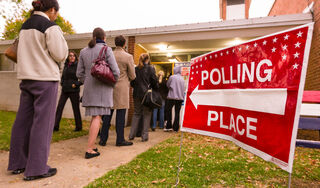Personality
Psychology of the Non-Voter Personality Type
Cutting-edge research helps explain the half of Americans who don't vote.
Posted October 27, 2020 Reviewed by Devon Frye

It is getting increasingly difficult not to become a "political junkie" these days as Americans find themselves within two weeks of Election Day. Some of the most longstanding questions any political junkie has include: (a) who are these non-voters? and (b) why don't they vote?
The facts are that roughly half of American adults do not vote in presidential elections. Voting in a presidential election provides a discrete, significant, specific behavior that has a time, place, and duration associated with it. Given the prevalence and seeming ubiquity of politics in the media, from SNL and late-night shows to Twitter and the pages of Psychology Today, it seems that even though this is a discrete behavior, it may be indicative of a more complex, related identifiable personality pattern comprised of traits i.e., the tendency to behave a certain way in a certain situation and socio-demographic profile.
It turns out that we political junkies are in luck! There is no need for a four-year dissertation quality study: A comprehensive study examining this specific question has been ongoing for several years. Funded by the Knight Foundation, researchers identified individuals who don't vote and assessed them. Non-voters were asked a variety of questions about how they are in interpersonal relationships and in different situations. Non-voters were asked to answer basic socio-demographic questions and unstructured focus groups were carried out.
The results reported by this study consists of the percentage of non-voters versus voters who answered a question in a specific way in a series of questions. The percentage of non-voters versus voters who agreed or disagreed with various statements was generally equivalent. The groups were overall remarkably similar across a wide variety of variables in connection to politics.
Non-voters differed from voters in connection to (a) income, (b) education, (c) perceived difficulty of voting, (d) comfort with someone else making their decisions, and (d) attitudes toward having someone in Washington make decisions that affect their lives. Non-voters were considerably poorer, less educated, more likely to perceive voting as difficult, more passive, and more apathetic than voters.
Extant research shows that income links with psychiatric severity; therefore, non-voters may have more psychopathology and experience more subjective distress as compared to voters. Other related personality correlates of non-voters include lack of conscientiousness/irresponsibility, fatalism, and lack of agency.
Further research is needed to understand if there is a valid non-voter personality type construct. This study could not answer the question but provided a basis for the formation of hypotheses regarding non-voter personality functioning.


